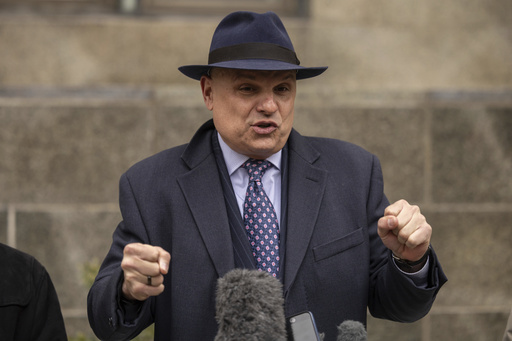NEW YORK — On Tuesday, Steve Bannon entered a guilty plea to charges of defrauding contributors to a private initiative aimed at constructing a barrier on the U.S.-Mexico border. This development concludes a legal case that Bannon has labeled as a “political persecution.”
As part of a plea agreement that spared him from incarceration, Bannon exited the courthouse expressing that he “felt like a million bucks.” The 71-year-old, who has had a longstanding alliance with former President Donald Trump, pleaded guilty in Manhattan’s state court to a single count of scheme to defraud, classified as a low-level felony. This case revolves around We Build the Wall, a non-profit organization that Bannon once himself thought might be a scam.
Under the terms of his plea, Bannon must avoid legal troubles over the next three years to prevent additional sanctions, which could include jail time. Furthermore, he is disallowed from raising funds or serving in any official capacity within charities in New York. He is also prohibited from using, selling, or possessing any donor data related to the border wall initiative.
Bannon was initially slated to stand trial on March 4. His attorney, Arthur Aidala, mentioned that while Bannon contemplated fiercely contesting the case, he ultimately chose to plead guilty after assessing how a jury in the predominantly Democratic Manhattan might perceive him. As a part of his plea deal, prosecutors dismissed charges of money laundering and conspiracy against him.
This plea agreement unfolded shortly after U.S. Attorney General Pam Bondi instructed the Justice Department to look into what Trump described as the “weaponization of prosecutorial power.” Outside the courtroom, Bannon called on Bondi to initiate immediate criminal investigations targeting Manhattan District Attorney Alvin Bragg, whose team prosecuted him, and New York Attorney General Letitia James, who has been at the forefront of legal confrontations with Trump over his business operations and administration policies. Both Bragg and James are affiliated with the Democratic Party.
Bannon noted that Bragg has the authority to convene a grand jury at any time, potentially leading to unsubstantiated criminal charges. He referred to James as the “queen of lawfare” and cautioned that Trump and his supporters should be apprehensive regarding the “out-of-control” management of the city.
Bragg’s involvement in this case surfaced after Trump issued a pardon that reduced federal charges against Bannon shortly before the end of his presidency in 2021. Since presidential pardons are applicable solely to federal offenses, Bragg proceeded with state-level charges against Bannon for misleading donors—many of whom hailed from New York—by falsely promising that their contributions to We Build the Wall would be directed entirely towards the construction of the border wall. Prosecutors contended that these contributions were instead used to enrich Bannon and other project associates.
Launched in 2018 after Bannon’s dismissal as Trump’s chief strategist, the fundraising campaign accumulated over $20 million and managed to erect a modest length of fencing along the border. However, the initiative soon faced challenges from the International Boundary and Water Commission and drew both federal scrutiny and criticism from Trump himself, despite being aligned with his policy objectives.
In a statement, Bragg noted that this resolution serves the primary objective of safeguarding charitable operations in New York from fraud. He emphasized the state’s dedication to combating deceit across various sectors, including charities and corporations.
Until recently, Bannon appeared determined to pursue a trial. He enlisted new legal representation and initiated preparations for a vigorous defense following a ruling from Judge April Newbauer that allowed certain evidence to be presented to jurors. Among this evidence was an email where Bannon expressed concerns about the legitimacy of the fundraising efforts, questioning whether it was feasible to build the wall with the funds raised.
Prior to entering his plea, Bannon’s legal team filed motions seeking dismissal of the case, citing claims of unconstitutional selective law enforcement. However, the judge’s ruling on this matter became irrelevant once Bannon opted for a plea deal on Tuesday.
Two other associates involved in the We Build the Wall project, Brian Kolfage and Andrew Badolato, have already pleaded guilty to federal charges and received prison sentences. A third individual, Timothy Shea, was also convicted and sentenced.
Bannon previously served four months in federal prison last year for non-compliance with a subpoena during the congressional investigation into the events of January 6, 2021. He was released in October.
